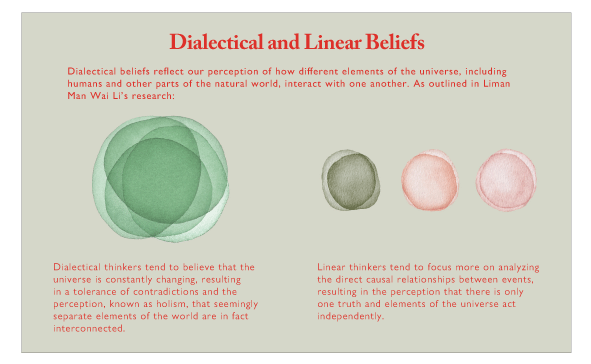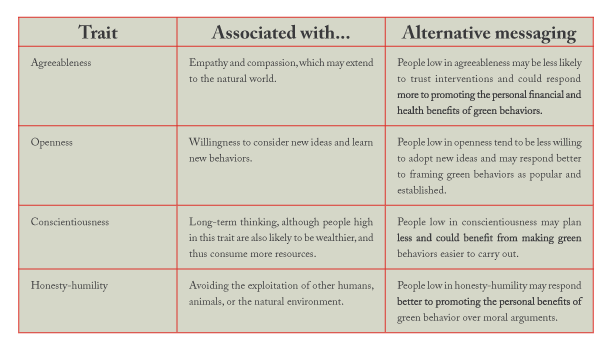Featured
Cultivating Cultures of Sustainability
Harnessing personalities and perspectives to create more sustainable societies

Responsibility for environmental degradation and climate change can hardly be placed on the shoulders of any one person. An individual could, theoretically, do nothing but drink from disposable water bottles and eat prepackaged meals imported from around the world while basking in 24-hour, fossil-fuel-powered air conditioning—and yet have virtually no impact on the world’s climate if their society as a whole was committed to green living. The same could probably be said for a zero-waste vegan living off the grid in a country dominated by throwaway consumer culture.
For more on how thinking styles and personality influence proenvironmental attitudes and behavior, see these infographics below:
The impact of consumption is cumulative and systemic. Not only do the choices, diet, and energy usage of every individual consumer coalesce into a society’s overall ecological impact, but that society’s environmental policies and social norms dictate the boundaries of what decisions are financially feasible and socially acceptable for for people to make. The repercussions are greatest for lower-income people, immigrants, and people from other disadvantaged groups who may lack the resources needed to prevent or recover from natural disasters, pollution, and other environmental stressors, according to psychologist and health researcher H. Shellae Versey (Fordham University).
“Climate change agendas must clearly acknowledge the cumulative risks for socially vulnerable groups,” Versey explained in a 2021 paper. “Any intersectional policy on climate change must coordinate action among all stakeholders.”
There is no one-size-fits-all approach to climate change, she added, but considering who is most at risk and why—whether because of housing instability, a lack of social safety nets, regional risks related to flooding and wildfires, or experiences of racism, sexism, and other forms of bias—can help create policies that are a good fit for a given community.
“Nowhere is the phrase ‘think globally, act locally’ more appropriate than addressing the harms by climate change,” Versey wrote.
Cultivating cultures of sustainability
To turn the tide of ecological devastation, humans must develop new cultures of sustainability, wrote APS Fellow Yoshihisa Kashima (University of Melbourne, Australia) in a 2020 paper published in Current Directions in Psychological Science.
Broadly speaking, culture is a dynamic process through which information is socially transmitted between individuals, and it is also the driving factor in how humans choose to go about constructing a niche in our natural environment, Kashima explained. That niche consists not only of buildings and other structures but our social networks, governments, and other institutions.
“There is hope if humanity can craft cultures of sustainability, namely, cultures that highlight and reward the ideas and practices that help reduce our environmental impact while sustaining global human well-being,” wrote Kashima.
A lasting culture of sustainability, Kashima continued, needs not only to guide humans toward living within the planetary boundaries of Earth but also to make room for equitable economic development—green and otherwise.
“Ecological sustainability requires societal sustainability,” Kashima explained in an interview with the Observer. “This is because realizing environmentally sustainable futures requires collective action understood as many people’s participation in coordinated activities in this globalized society.”
Kashima suggests that cultures of sustainability consist of the following four parts.
The human-nature relationship: One of the primary ways that cultures define what it means to be human is through ideas about humans’ relationship with the rest of the natural world. This cultural concept can lead individuals to construct different kinds of environmental identities. Encouraging people to view themselves as a part of nature can make environmental strivings more personal, Kashima wrote, increasing individuals’ willingness to conserve energy and produce less waste for the benefit of their environment.
Cultural artifacts: How we conceive of human-made objects can also influence our consumption choices. The system of mass production common in industrialized countries today, Kashima noted, contributes to the construction of a linear economy in which resources are taken from nature, used by humans, and disposed of somewhere out of sight, where unseen waste continues to influence the natural world. A cultural shift toward the reuse and recycling of resources could support the evolution of a more circular economy, in which artifacts are used longer and repurposed in a cyclical fashion to minimize waste and environmental impact.
Norm talks: Social norms convey the social costs and benefits of behaviors. Shifts in norms are thus one way in which small communities can overcome the infamous “tragedy of the commons” even in the absence of government regulation, Kashima wrote: Norms can serve as a powerful reminder of the need to contribute to the greater good at the local level. Emphasizing the dynamic nature of norms in our conversations about environmental impact can also encourage individuals to adopt new behaviors that may one day become common.
A vision of utopia: These cultural components can be united through a common vision for the future, Kashima added—either in the form of an ideology, which seeks to preserve the status quo, or that of a utopia, which offers a glimpse of a better world. Imagining a green utopia can not only reduce people’s tendency to justify the current system but increase their willingness to engage with environmental policy and to believe that their engagement could make a meaningful difference.
In practical terms, these steps could take the form of performing “green talks” at the community level, writing to politicians, donating, or even engaging in pro-environmental protests, Kashima wrote, all of which encourage individuals and institutions to adopt more sustainable practices.
“I hope that the persistent groundswell of global civil society will enable and encourage institutional changes at the national and international levels,” Kashima said. “After all, those who make policies and policy decisions are also participants in this global civil society and of cultural dynamics for our common future.”
Belonging, wherever you are
All of the cultural components outlined above exist to varying degrees in cultures across the world, but the path to constructing a more sustainable society won’t look the same everywhere.
“My research would suggest the importance of adopting a cultural perspective if we want to make pro-environmental policies or pro-environmental campaigns effective in different places,” said APS Rising Star Liman Man Wai Li (The Education University of Hong Kong), who studies psychosocial health, in an interview with the Observer.
Eastern and Western cultures are often described in terms of interdependence and independence, respectively, with those in the former group more likely to perceive themselves as interconnected with others and those in the latter group more likely to perceive themselves as autonomous. Individuals within cultures can differ significantly in this respect, of course, but everybody needs to find a way to fulfill their basic needs—including the need to belong.
Some people with more independent self-concepts, however, can satisfy this need for connection even without a human “other,” a preference that may influence the sustainability of their behavior.
In a 2021 study of 206 Americans and 959 Singaporeans, Li and colleagues Mengru Liu (National University of Singapore) and Kenichi Ito (Nanyang Technological University, Singapore) found that people with more independent self-concepts who felt close to nature also reported a reduced need to belong. Independent-minded people who did not feel close to nature and people with more interdependent self-concepts did not demonstrate this relationship.
These findings support the idea that connecting with pets, places, and nature itself could at least partially fulfill the need to belong among more independent people, Li and colleagues wrote. Nature relatedness has also been linked with making more sustainable consumer choices.
“Strengthening the connection between humans and nature could help promote more individuals’ pro-environmental behaviors,” Li said in the interview.
Crafting cross-cultural education
Another dynamic that may influence perceptions of nature, as well as the consequences of climate change, is the extent to which individuals engage in dialectical or linear thinking.
Dialectical thinking arises from the belief that the universe is constantly changing, resulting in a tolerance of contradictions and a tendency toward holism—the sense that seemingly separate elements of the world are in fact interconnected. Linear thinking focuses more on analyzing the direct causal relationships between events.

Dialectical beliefs form the basis of belief systems like Buddhism and Daoism, and so tend to be more common in East Asian cultures, whereas linear thinking tends to be more common in North America and Europe, Li and Ito wrote in a 2019 study. Within any culture, however, individuals will exhibit dialectical and linear thinking to differing degrees.
In that study, which involved a mix of Eastern and Western participants, Li and Ito found that more holistic thinkers reported a greater affinity for nature, as well as a greater awareness of the risks posed by pollution, which in turn correlated with a stronger commitment to pro-environmental action.
In 2021, however, Li, Ito, and colleagues Dongmei Mei (Guizhou Normal University, China) and Wen-Qiao Li (Hokkaido University, Japan) conducted a study of 83 Chinese and 76 American participants. They found that dialectical thinkers were more likely to predict that climate change would moderate itself over time, whereas linear thinkers more often predicted that temperatures would continue to rise.
“Dialectical thinkers tend to show greater pro-environmental commitment but are less likely to predict an increasing trend of climate change, although the majority of participants perceived a rising trend of climate change regardless of cultures and manipulation conditions,” Li explained.
These and other findings suggest the importance of adopting a cultural perspective when designing climate change education programs. For example, Li explained, dialectical thinkers tend to be less decisive when making trivial decisions about the environment, but this tendency can be counteracted by emphasizing the importance of generating solutions to these issues.
“Although the proper knowledge of climate change can be acquired through climate change education… the effectiveness of global climate change education programs may be rather limited if we ignore the potential negative influence of cultural factors that substantially shape people’s habitual thinking,” Li and colleagues concluded.
Patterns of personality
Although reorienting our cultures toward sustainability could alter the trajectory of our societies, not every citizen responds to a given culture in the same way. Looking at environmental advocacy through the lens of personality psychology could help environmental advocates reach new populations.
“An individual’s impact on the environment typically involves a variety of behaviors enacted across a wide range of situations and repeated over extended periods of time,” wrote Alistair Raymond Bryce Soutter, Timothy C. Bates, and René Mõttus (University of Edinburgh, Scotland) in a 2020 article published in Perspectives on Psychological Science. “This patterning of behavior is what personality research examines. Less commonly, but perhaps of equal importance, the personality traits and associated attitudes of a few powerful individuals may have substantial and lasting effects on climate policies.”

Soutter and colleagues examined this relationship through a meta-analysis of 38 studies of how the Big Five and HEXACO measures of personality relate to people’s environmental attitudes and behaviors. The more commonly used Big Five personality inventory conceptualizes personality as an amalgamation of five traits—extraversion, agreeableness, openness, conscientiousness, and neuroticism—whereas the HEXACO personality inventory adds a sixth dimension: honesty-humility, a measure of an individual’s tendency to cooperate with or exploit others.
These studies collected data from 44,993 individuals in 18 countries (Australia, Belgium, Canada, China, Germany, Greece, India, Japan, Lithuania, Malaysia, New Zealand, Romania, Russia, South Korea, Sweden, Taiwan, Turkey, and the United Kingdom). Taken together, they revealed that individuals who scored higher on openness, honesty-humility, agreeableness, and conscientiousness were more likely to adopt pro-environmental attitudes and behavior.
Although the effect sizes for these associations were small, Soutter and colleagues noted, they were on par with the effect size for the association between intelligence and academic performance, which are generally accepted to be linked.
Targeting less persuadable personalities
These traits could translate into pro-environmentalism in several ways, the researchers noted. People high in openness are generally more willing to consider new ideas and learn new behaviors, and those high in honesty-humility are often less willing to exploit other humans, animals, or the natural environment. Agreeableness is associated with empathy and compassion—which in this case might extend to empathy for nature or future generations who will have to live with the environmental consequences of current behaviors—and conscientiousness has been associated with delaying gratification and other long-term thinking.
However, possessing high levels of these traits isn’t a guarantee that a person is looking to go green, Soutter and colleagues added.
Conscientiousness in particular, the researchers wrote, has also been linked with closely following social norms, but many behaviors that signal high social status, such as traveling abroad or owning a large home, aren’t necessarily compatible with a sustainable lifestyle. High conscientiousness is also associated with wealth, and despite the common refrain that environmental degradation is somehow linked to overpopulation, a minority of wealthy people and nations consume most of the world’s resources and generate the vast majority of carbon emissions and other pollution.
These findings could be translated into change on both the personal and political front in a number of ways, Soutter and colleagues wrote. Instead of “preaching to the choir” of other environmentalists, advocates could target people low in openness—for example, by framing green behaviors as popular and established rather than novel. People low in conscientiousness, on the other hand, might benefit more from practical strategies for sticking with green behaviors than philosophical arguments for doing so.
People low in honesty-humility and agreeableness might also be less swayed by the standard moral arguments around environmentalism. Instead, Soutter said in an interview with the Observer, messaging might highlight the personal benefits of green behaviors—for example, how using renewable energy can result in cheaper power sources and reduce the health effects of pollution.
“Simply speaking, why target environmentalists to act environmentally when it’s non-environmentalists who need the convincing?” Soutter asked. “Someone whose personality orientates them to be more environmental is already likely to be participating in environmental behaviors. In contrast, more energy, and, as we suggested, more targeted interventions are needed for those who naturally (personality-wise) would not be inclined to act environmentally.”
Focusing on the personal benefits of green behaviors could also help spur change among less environmentally inclined people whose perspectives are tied, at least in part, to external factors such as socioeconomic conditions, urbanization, and household size.
“Even if these attitudes and behaviors can, to a substantial degree, be explained by personality traits, this does not mean that they are immutable,” Soutter wrote.
Feedback on this article? Email [email protected] or scroll down to comment.
References
Ge, M., Friedrich, J., & Damassa, T. (2014). 6 graphs explain the world’s top 10 emitters. World Resource Institute. https://www.wri.org/blog/2014/11/6-graphs-explain-world-s-top-10-emitters
Kashima, Y. (2020). Cultural dynamics for sustainability: How can humanity craft cultures of sustainability? Current Directions in Psychological Science, 29(6), 538–544. https://doi.org/10.1177/0963721420949516
Kenichi, I., & Li, L. (2019). Holism and pro-environmental commitment: An examination on the mediating roles of affective and cognitive determinants. Personality and Individual Differences, 149, 160–166. https://doi.org/10.1016/j.paid.2019.05.055
Li, L., Mei, D., Li, W. Q., & Ito, K. (2021). Dialectical versus linear thinking shapes people’s anticipation of climate change. Frontiers in Psychology, 11, Article 623591. https://doi.org/10.3389/fpsyg.2020.623591
Li, L., Liu, M., & Ito, K. (2021). The relationship between the need to belong and nature relatedness: The moderating role of independent self-construal. Frontiers in Psychology, 12, Article 638320. https://doi.org/10.3389/fpsyg.2021.638320
Li, L. M. W., Mei, D., Li, W.-Q., & Lee, H. (2020). The relationship between dialectical beliefs and proenvironmental behaviors. Environment and Behavior, 52(3), 223–247. https://doi.org/10.1177/0013916518799821
Soutter, A. R. B., Bates, T. C., & Mõttus, R. (2020). Big Five and HEXACO personality traits, proenvironmental attitudes, and behaviors: A meta-analysis. Perspectives on Psychological Science, 15(4), 913–941. https://doi.org/10.1177/1745691620903019
Versey, H. S. (2021). Missing pieces in the discussion on climate change and risk: Intersectionality and compounded vulnerability. Policy Insights from the Behavioral and Brain Sciences, 8(1), 67–75. https://doi.org/10.1177/2372732220982628





APS regularly opens certain online articles for discussion on our website. Effective February 2021, you must be a logged-in APS member to post comments. By posting a comment, you agree to our Community Guidelines and the display of your profile information, including your name and affiliation. Any opinions, findings, conclusions, or recommendations present in article comments are those of the writers and do not necessarily reflect the views of APS or the article’s author. For more information, please see our Community Guidelines.
Please login with your APS account to comment.